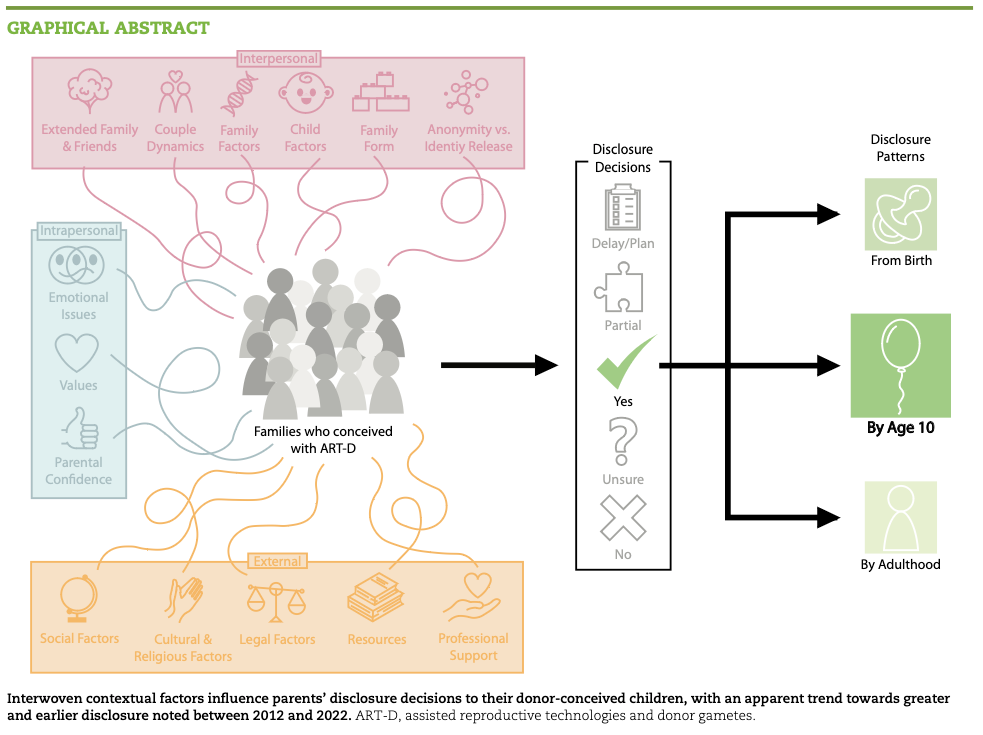Parents' disclosure to their donor-conceived children in the last 10 years and factors affecting disclosure: a narrative review
Trend toward disclosure by age ten in donor conception families, with lesbian and single mothers more likely to disclose than heterosexual parents
Duff, M. A., & Goedeke, S. (2024). Parents' disclosure to their donor-conceived children in the last 10 years and factors affecting disclosure: A narrative review. Human Reproduction Update, 30(4), 488-527. https://doi.org/10.1093/humupd/dmae010
Research Question: Are parents disclosing to their donor-conceived children, and what factors have influenced their disclosure decisions across different contexts and family forms in the last 10 years?
Research Methods: Systematic search and narrative review of English-language, peer-reviewed articles published 2012-2022. Included quantitative, qualitative, and mixed-methods studies.
Sample Size and Description: 37 articles from 34 studies representing 4,248 parents (heterosexual, single, same-sex, and transsexual) living over 10 countries with varying donor identity laws.
Analysis Methods: Used PRISMA guidelines and JBI Critical Appraisal Tools. Narrative synthesis of findings.
Key Findings:
There is a general trend towards disclosure. Most parents who choose to tell their children do so before age 10, with many beginning these conversations during early childhood. Parents who delay making the decision often end up not telling at all.
Research indicates that disclosure works best as an ongoing dialogue rather than a single conversation.
Family structure plays a significant role in disclosure patterns. Single mothers and lesbian couples are more likely to tell their children about donor conception. Heterosexual couples tend to be less likely to tell.
Multiple factors influence parents' decisions about disclosure. Personal factors include their confidence in discussing the topic, emotional readiness, and values regarding honesty and children's rights to know their origins. Family dynamics also play a crucial role, particularly the level of agreement between parents about whether to tell, support from extended family, and considerations about children's age and maturity. Broader social factors significantly impact disclosure decisions. Cultural and religious beliefs, support from healthcare providers, access to resources and guidance, and general social attitudes about donor conception all influence parents' choices. Legal requirements in different countries also play a role, though the research shows that even in countries requiring donors to be identifiable to children at age 18, this hasn't automatically led to higher disclosure rates.
Parents face several key challenges in the disclosure process. Many express uncertainties about the best age to tell their children, worry about potential reactions, and lack confidence in handling these sensitive conversations. Concerns about social stigma and limited access to support and resources also create barriers to disclosure.
Limitations: In general, systematic review limitations include varying quality across included studies and challenges in comparing studies with different methodologies and sample sizes. Parents who don't plan to tell their children about donor conception are less likely to participate in studies, potentially skewing the result of any study toward families more comfortable with disclosure. Cultural and religious contexts greatly affect decisions but aren't fully represented in current research.
Applications: The research highlights a clear need for better ongoing support and counseling, clear guidance on how and when to tell, accessible resources like books and support groups, connections with other donor conception families, and professional help throughout the process.
Funding Source: Not specified
Lead Author: Michelle Duff is a Masters student in Counselling Psychology at the Auckland University of Technology.




This is true, regarding culture. It's hard to explain to the general "western" population who does not still have close ties with the old world. Especially in societies where genetics and passing down one's name and history play such an important role, and especially for males (this is especially true in East Asian societies that have kept long histories of the male line. It's not as extreme as it used to be, but the vibe is still there). Heck, even for me, a female, I was told that to make a child NOT feel too different, that you should keep things as "normal" as possible. It made my eyes roll when my dad said this (my mom has largely remained silent/indifferent). I was like "so what if you're a two mom or two dad family? Or like your (my dad's) friend's daughter who was a single mom by choice?").